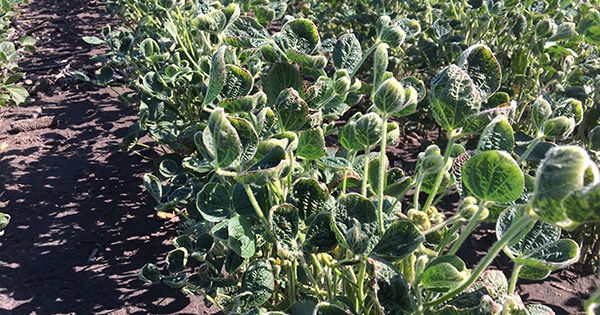
11 Dec Dicamba Attorneys | Arkansas Moves to Ban Dicamba
Dicamba Attorneys | Dicamba Lawyers| Dicamba Lawsuit
Dicamba Attorneys – Arkansas Moves to Ban Monsanto’s Blockbuster Herbicide
Defying a lawsuit from the seed and pesticide giant, Arkansas put its foot down.
Dicamba Attorneys – According to a recent article entitled Arkansas Moves to Ban Monsanto’s Blockbuster Herbicide by Tom Philpott on November 11, 2017, “The Missouri Department of Agriculture has joined its Arkansas counterpart in limiting dicamba use during the 2018 growing season. In a statement released last week, the Missouri ag agency announced it would ban the use of Engenia, a “low volatility” dicamba formulation marketed by the German chemical giant BASF, after July 15. For 10 counties clustered in the state’s southeastern corner, known as the Bootheel, where off-target dicamba damage was reportedly heaviest in 2017, the cut-off date will be June 1. The department said it “anticipates” issuing similar restrictions on the other two low-volatility dicamba formulations on the market, Monsanto’s Xtendimax and DowDupont’s Fexapan.”
The claims continue to mount against Monsanto, as recently shown in a recent vote by the Arkansas State Plant Board; “[T]he results were a vote of 10 to 3 to ban most applications of the weedkiller between April 16 and October 31.”
Dicamba Attorneys | Dicamba EPA Reports | Dicamba Crop Damage
Philpott’s article continued by stating, “The EPA reports 3.6 million acres of soybeans were damaged by dicamba this year, as well as untold acres of tomatoes, watermelon, cantaloupe, vineyards, and even residential gardens. The company, meanwhile, has a lawsuit pending, launched in October, seeking to ‘prevent the Plant Board from continuing to regulate the use of Monsanto’s new low-volatility dicamba herbicide.’ Back on July 11, Arkansas banned dicamba for 120 days.”
The new ban would pretty much halt the use of Monsanto’s seeds for soybeans and cotton varieties next year; these seeds were engineered to withstand dicamba. Monsanto’s newest products give farmers the ability to to spray dicamba directly on crops without damaging them, yet still killing those pesky pig-weeds.
However, Arkansas had to take action because “dicamba has a tendency to volatilize—that is, after it has been applied, it’s prone to convert into a gas be carried from its intended site, potentially harming vegetation that gets in its path. The volatility problem increases as temperatures rise, hence the ban on use during warm months.”
To combat the rising complaints, Monsanto, BASF and DuPont released “low-volatility” dicamba formulations, “but this past growing season—the new seeds’ first year in widespread use—saw an explosion of complaints throughout the soybean belt of off-target damage.”
“The Environmental Protection Agency reports 3.6 million acres of non-resistant soybeans alone were damaged by dicamba this year, as well as untold acres of tomatoes, watermelon, cantaloupe, vineyards, pumpkins, vegetables, tobacco, residential gardens, trees, and shrubs.”
In an October note to investors, the Monsanto declared its new dicamba-resistant soybeans a “tremendous success” and vowed their acreage planted would double next year.
Dicamba Drift Crop & Plant Damage | Reports of Dicamba Damage | Dicamba Attorneys
Dicamba Attorneys – As farmers and landowners continue to report instances of extensive clop and plant damage, one thing is becoming extremely clear; Dicamba litigation has just begun. Typical of many claims is the allegation that some of the newer formulas of dicamba are incapable of being applied safely to crops and plants. In many instances, the farmers experiencing crop damage or plant damage didn’t even apply the dicamba to their own fields. Therefore, many of these farmers and landowners are alleging that these particular dicamba formulas are overtly unsafe.
Dicamba Attorneys – If you suspect that your crops or plants have been damaged by Dicamba, contact Paul Lesko and the attorneys of Peiffer Wolf Carr & Kane by filling out a contact form or by calling 314-833-4826 for a FREE Consultation. Join the Dicamba Lawsuit today.
Dicamba Attorneys| Peiffer Wolf Carr & Kane | Dicamba Lawsuit
Peiffer Wolf Carr & Kane and Arkansas attorneys Michael Smith and Paul James have already filed a class action for a group of farmers on July 19, 2017 in Missouri (Smokey Alley Farm Partnership et al. v. Monsanto Company et al.). Our suit alleges that BASF, Dupont and Monsanto are also involved in anti-trust activity through the widespread introduction of new dicamba technology and products, essentially forcing farmers to plant dicamba-tolerant acreage as a means of protection. This is in addition to our dicamba drift damage claims.
Dicamba Drift Lawyer, Paul Lesko, of Peiffer Wolf Carr & Kane says new dicamba formulations do not work as claimed by BASF and Monsanto:
“We’re bringing claims of product liability because farmers are in a quandary. They want to plant seeds of their choice, but due to damage potential, have to consider buying dicamba-tolerant soybeans from a defensive position. We also have anti-trust issues. As discovery is ongoing, we believe the evidence will show Monsanto and BASF knew more dicamba damage would lead to increased sales.”
In addition to the suits mentioned above, additional suits have been filed that claim additional offenses: irresponsible marketing, product liability, breach of implied warranty, deceptive trade practices, and many more.
FREE Consultation | Farmers & Landowners with Crop or Plant Damage
The Dicamba Attorneys at Peiffer Wolf Carr & Kane and Arkansas attorneys Michael Smith and Paul James are on behalf of farmers and landowners to seek maximum compensation for the damages suffered due to Dicamba. If you suspect that your crops or plants have been damaged by dicamba, contact Peiffer Wolf Carr & Kane by filling out a contact form or by calling 314-833-4826 for a FREE Consultation.
Also, you can reach Paul Lesko directly at 314-833-4826 or at plesko@prwlegal.com.



